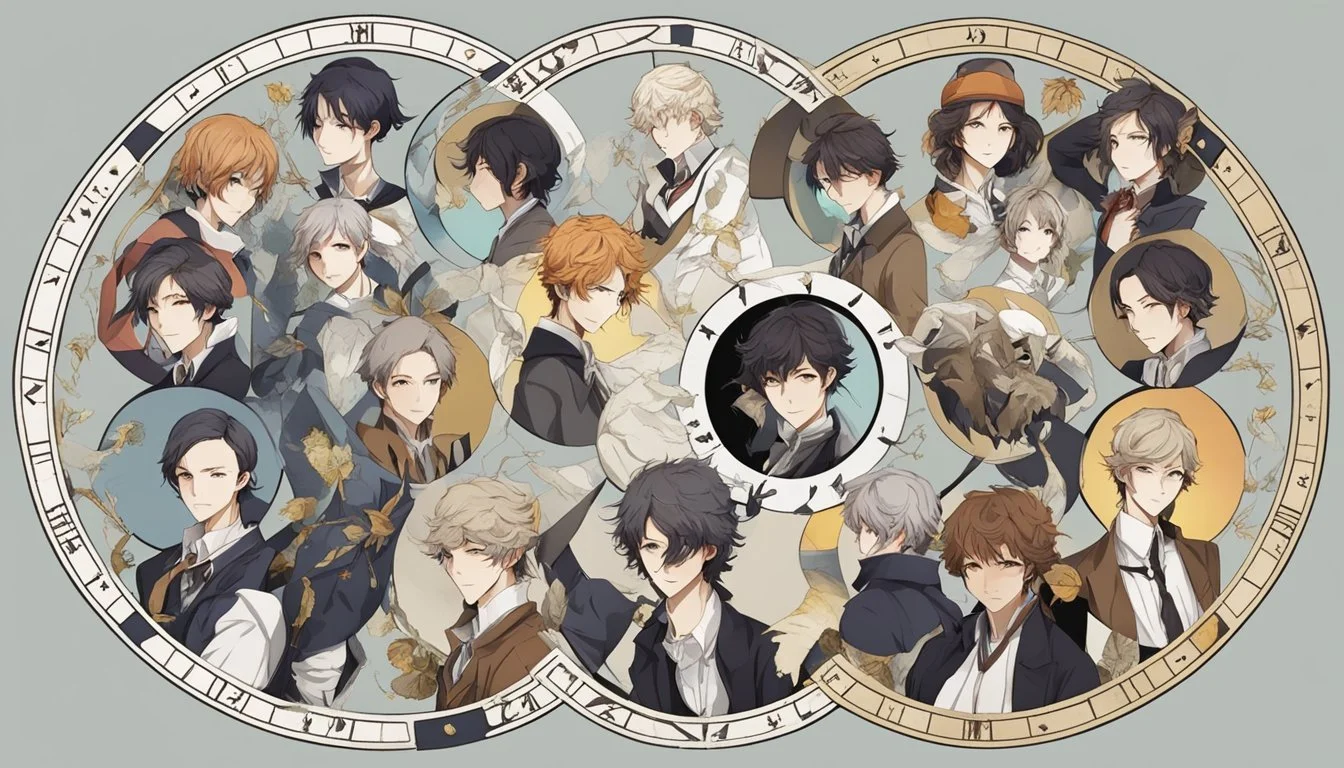Dive Deep into the BSD Personality Types: What Your Favorite Characters Reveal!
Bungou Stray Dogs captivates audiences with its unique blend of supernatural abilities and literary references. The series' characters, inspired by real-life authors, possess diverse personalities that add depth to the storyline. Understanding these characters through the lens of personality types can enhance viewers' appreciation of the show.
The MBTI (Myers-Briggs Type Indicator) framework offers insights into the motivations and behaviors of Bungou Stray Dogs characters. This psychological tool categorizes individuals into 16 distinct personality types based on four key dimensions: Extraversion/Introversion, Sensing/Intuition, Thinking/Feeling, and Judging/Perceiving.
Exploring the MBTI types of Bungou Stray Dogs characters provides fans with a new perspective on their favorite literary figures. From the enigmatic Osamu Dazai to the intense Ryunosuke Akutagawa, each character's personality type sheds light on their actions and decisions throughout the series.
Understanding BSD Personality Types
Bungou Stray Dogs (BSD) features characters with diverse and complex personalities. These personalities are often analyzed using established frameworks to provide deeper insights into character motivations and behaviors.
Basics of BSD Personality Typing
BSD personality typing draws inspiration from real-world personality models. Characters are categorized based on their traits, behaviors, and decision-making processes. This system helps fans understand character dynamics and predict potential actions.
Personality types in BSD are not explicitly stated but are inferred from character actions and dialogues. For example, Osamu Dazai displays traits often associated with ENTP in MBTI, such as quick wit and strategic thinking.
Characters' abilities in BSD often align with their personality types. Atsushi Nakajima's transformative power reflects his adaptable and growth-oriented personality.
Comparison to MBTI and Enneagram Models
BSD personality typing shares similarities with MBTI and Enneagram models but is tailored to the unique world of the series. Like MBTI, it considers cognitive functions and how characters process information and make decisions.
The Enneagram's focus on core motivations is also reflected in BSD character analysis. For instance, Chuuya Nakahara's drive for competence aligns with Enneagram Type 3 traits.
BSD typing differs by incorporating the impact of supernatural abilities on personality development. This adds a unique layer to character analysis not present in traditional models.
Fans often debate character typings, as interpretations can vary based on different scenes or story arcs. This flexibility allows for rich discussions within the BSD community.
Significance of Personality Types in 'Bungou Stray Dogs'
Personality types play a crucial role in shaping the characters and plot of 'Bungou Stray Dogs'. They influence character interactions, decision-making processes, and overall story development.
Character Analysis Through Types
In 'Bungou Stray Dogs', personality types provide insight into character motivations and behaviors. The MBTI framework offers a structured approach to understanding the diverse cast. For example, gut types focus primarily on fulfilling physical needs, while other types may prioritize social perception or logic.
Personality types also impact how characters approach challenges and conflicts within the series. Some may rely on careful planning and logic, while others act on instinct or emotion. This diversity in problem-solving styles creates dynamic interactions and plot developments.
The series utilizes personality types to create compelling character arcs. As characters face various trials, their core traits are tested and sometimes transformed, adding depth to their development throughout the story.
Atsushi Nakajima and Osamu Dazai's Types
Atsushi Nakajima and Osamu Dazai represent contrasting personality types in 'Bungou Stray Dogs'. Atsushi is often portrayed as introspective and adaptable, suggesting an introverted and perceiving type. His journey of self-discovery and growth is central to the series.
Osamu Dazai, on the other hand, exhibits traits of an unpredictable and witty character. His personality type likely includes strong intuitive and thinking components. Dazai's complex nature and strategic mind make him a key player in many of the series' plot twists.
The interplay between Atsushi and Dazai's differing personality types creates a dynamic relationship. Their contrasting approaches to situations often lead to unexpected outcomes and drive the narrative forward in intriguing ways.
MBTI Profiles of 'Bungo Stray Dogs' Characters
The characters in Bungo Stray Dogs exhibit diverse MBTI personality types, reflecting their complex traits and motivations. These profiles offer insight into the characters' decision-making processes, strengths, and potential weaknesses.
INTJ and INFJ Personalities
Osamu Dazai embodies the INTJ personality type. His strategic mind and ability to predict outcomes align with the Mastermind archetype. Dazai's complex plans and manipulative tendencies showcase his intuitive and thinking preferences.
Atsushi Nakajima represents the INFJ type. His idealistic nature and desire to help others reflect the Counselor archetype. Atsushi's empathy and insightfulness, combined with his tendency for self-doubt, are typical INFJ traits.
Both types share intuition as their dominant function, allowing them to see patterns and possibilities others might miss. This trait proves invaluable in the dangerous world of ability users.
INFP and ENTP Personalities
Doppo Kunikida exemplifies the INFP personality type. His strong moral compass and idealistic views align with the Healer archetype. Kunikida's dedication to his ideals and struggle with real-world limitations are characteristic INFP traits.
Ranpo Edogawa fits the ENTP profile. His quick wit, love of mental challenges, and ability to see connections others miss are hallmarks of the Inventor archetype. Ranpo's confident demeanor and enjoyment of verbal sparring reflect typical ENTP behavior.
These types share the NP preference, giving them flexibility in their approach to problems. This adaptability serves them well in the unpredictable situations they often face.
ISFJ and ISFP Personalities
Kenji Miyazawa represents the ISFJ personality type. His loyal nature, attention to detail, and desire to be of service align with the Protector archetype. Kenji's reliable presence and practical approach to problem-solving are typical ISFJ traits.
Kyouka Izumi embodies the ISFP type. Her artistic sensibilities and strong personal values reflect the Composer archetype. Kyouka's struggle to find her place and express herself authentically are characteristic ISFP challenges.
Both types share the SF preference, giving them a grounded approach to the world combined with a focus on personal values. This combination allows them to navigate complex moral situations while remaining true to themselves.
Analyzing Zodiac Signs in 'Bungou Stray Dogs'
'Bungou Stray Dogs' features characters with diverse personalities that align with various zodiac signs. The series incorporates astrological elements to enhance character depth and development.
Libra and Other Zodiac Personalities
Libra personalities in 'Bungou Stray Dogs' often display traits of balance and harmony. Characters associated with this sign tend to be diplomatic and seek fairness in their interactions.
Other zodiac signs are also represented in the series. Aries characters may exhibit bold and impulsive behavior, while Taurus types show steadfastness and determination.
Gemini-like characters often demonstrate versatility and quick wit. Cancer personalities might be more nurturing and protective of their allies.
Leo characters typically exude confidence and charisma, taking on leadership roles within their groups. Virgo types are often detail-oriented and analytical in their approach to problems.
Scorpio personalities in the series may be intense and passionate, with a tendency towards secrecy. Sagittarius characters often embody a sense of adventure and optimism.
Capricorn types are usually ambitious and disciplined, focused on their goals. Aquarius personalities might be more unconventional and independent in their thinking.
Pisces characters in 'Bungou Stray Dogs' may display intuitive and empathetic traits, often serving as emotional support for others.
Archetypal Roles in 'Bungou Stray Dogs'
The characters in 'Bungou Stray Dogs' embody distinct archetypal roles that shape their interactions and drive the plot forward. These roles provide depth to the characters and create compelling dynamics within the story.
The Servant and The Realist
Akutagawa Ryunosuke exemplifies the Servant archetype in 'Bungou Stray Dogs'. His unwavering loyalty to the Port Mafia and his mentor Dazai defines his actions and motivations. Akutagawa's devotion often manifests as ruthless efficiency in carrying out orders.
In contrast, Kunikida Doppo represents the Realist archetype. He adheres strictly to schedules and plans, valuing practicality above all else. Kunikida's realistic approach often clashes with the more chaotic elements of the Armed Detective Agency.
These opposing archetypes create tension and balance within the series. The Servant's blind loyalty contrasts sharply with the Realist's pragmatic worldview. This dynamic leads to intriguing conflicts and character growth throughout the story.
The Role of Extroversion and Introversion
Extroversion and introversion represent core personality traits that shape how individuals interact with the world around them. These characteristics influence social behaviors, energy sources, and personal preferences.
Extroverted vs. Introverted Characters
Extroverted characters tend to draw energy from social interactions and external stimuli. They often thrive in group settings, seeking out conversations and collaborative activities. Extroverts typically feel energized after spending time with others and may become restless when alone for extended periods.
Introverted characters, in contrast, find their energy renewed through solitude and inner reflection. They prefer smaller social gatherings and may need time alone to recharge after social events. Introverts often excel in tasks requiring deep focus and independent work.
Both traits exist on a spectrum, with many individuals falling somewhere between the two extremes. Some people exhibit a mix of extroverted and introverted tendencies, adapting their behavior based on the situation.
Understanding these personality traits can help in various aspects of life, from career choices to relationship dynamics. Recognizing and respecting these differences can lead to more effective communication and collaboration in personal and professional settings.
Creating a 'BSD Personality Type' Account Online
Setting up a 'BSD Personality Type' account involves several key steps to ensure a smooth registration process and secure access. Users should pay close attention to the account creation procedures, terms of service, and data protection measures.
Account Registration Steps
To create a 'BSD Personality Type' account, start by visiting the official website. Click the "Sign Up" button, typically located in the top right corner. Enter a unique username and a valid email address. Choose a strong password that combines uppercase and lowercase letters, numbers, and symbols.
Verify your email address by clicking the link sent to your inbox. This step is crucial for account security and recovery.
Some platforms may require additional information such as date of birth or country of residence. Fill in these details accurately.
After submitting the registration form, you may need to complete a CAPTCHA to prove you're not a bot. Once done, your account will be created.
Understanding the User Agreement
Before finalizing your account creation, carefully read the User Agreement. This document outlines the terms and conditions for using the 'BSD Personality Type' platform.
Key points often include:
Acceptable use policies
Content ownership and sharing rules
Community guidelines
Account termination conditions
By creating an account, you agree to abide by these terms. It's important to understand your rights and responsibilities as a user.
The agreement may also cover dispute resolution procedures and jurisdiction information. If you have questions about any terms, contact customer support for clarification before agreeing.
Privacy Policy and Data Protection
The Privacy Policy explains how the platform collects, uses, and protects your personal information. Pay attention to:
Types of data collected (e.g., profile information, usage data)
Data storage and security measures
Third-party data sharing practices
User rights regarding personal data
'BSD Personality Type' platforms often use cookies and similar technologies. The policy should explain how to manage these settings.
Look for information on data retention periods and how to request data deletion. Many services offer privacy controls within account settings, allowing you to adjust your preferences.
Account Recovery Procedures
In case you forget your password, most platforms offer a "Forgot Password" option on the login page. Click this link and follow the instructions to reset your password.
Typically, you'll need to:
Enter your email address or username
Check your email for a password reset link
Create a new password
For added security, enable two-factor authentication (2FA) if available. This usually involves:
Setting up an authenticator app
Generating backup codes for emergencies
Keep your recovery email up to date. Some services may log you out of all devices after a password change for security reasons.





